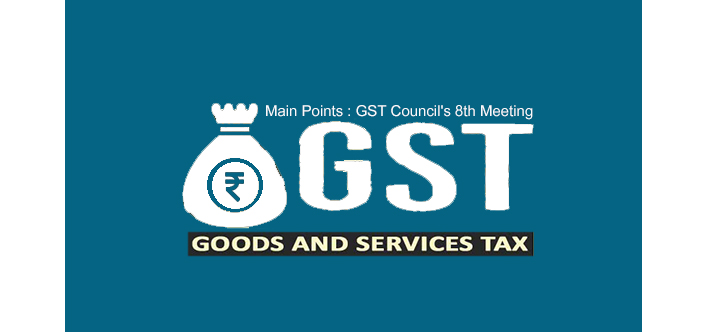
The main points of discussion in the 8th GST council meeting were as follows:
1. ISSUE OF DUAL CONTROL
In the 8th GST council meeting, the group of members didn’t have any common agreements on the issue of dual control. This issue made people think differently as many had different views on this topic. The State does not want the Centre to have the authority over all the small tax paying entities whereas The State does not have any problem in having Dual Control with the Centre for the authority of all the bigger tax payers. The Council also cannot decide the turnover to defy a small taxpayer from a bigger one, for some a company having a turnover below 5 crores will be a small tax payer whereas as per the Centre a company having a turnover of 1.5 crores will also be a small tax payer. The centre is not ready to accept the demands of state for access over 1.5 crores in case of small tax payers. The council wants to consider a high cut off rate and wants the Central Goods and Services Tax to be administered by the Centre and the tax payers below that cut off should be administered by the State.
2. CESS
CESS will be charged on many more goods such as luxury goods, aerated drinks, tobacco products and on high-end cars. The ultra-luxury goods and sin goods will have a GST cess for a period of 5 years. The major part of CESS will depend upon the current incidence of tax, if the clause of GST cess for 5 years raises any profit, then the council will decide on how to use these profits to compensate any other losses incurred by the State or Centre. Only the Clean Environment Cess will be retained and all the funds will be used to compensations.
3. INDUSTRY REPRESENTATION
The Government is deliberating all representation from Trade and Industry in the implementation of the GST bill. The Commerce and Industry sectors has given representation from officials to the GST council. The banking and insurance sector also has given representation to understand the impact of GST on products.
STATE WISE SCHEDULE FOR GST REGISTRATION
For more information on GST or for Registration under GST, feel free to reach us on, info@gapeseedconsulting.com or call +91-9599444639/+91-9599444630
More Newsletter
Most important Income tax changes which will occur from 1st April